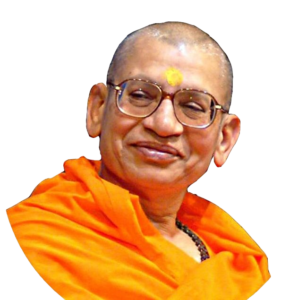
Spirituality: Desire pressures humans to violate the order
By Swami Viditatmananda Saraswati*
Na Me Bhaktaḥ Praṇaśyati – 10
There is order in the whole universe. Not only is there order, but there is also harmony. There is harmony among different elements of nature. For example, the planets stay in their appointed orbits and do not interfere with each other. It appears that everything is appointed to its place and its function. There seems to be an ordainer, a controller who has set rules for everything. All of these elements function as though they are obedient servants. Powerful forces like wind, fire, and water all function as obedient servants. Thus, there is an ordainer in the universe and there is an ordained universe.
All of nature is programmed to automatically be in harmony with the order except the human being because human beings are not totally programmed. With the exception of human beings, everything in the universe automatically conforms to harmony without any will or effort. The human being, who enjoys free will, has the freedom to violate that law. That’s what freedom means. If humans were also completely programmed to follow the order, there would be no question of choosing to violate the order. The choice is called freedom.
Having freedom, the human being is likely to violate the order because of the internal pressure of desire. Rāga and dveṣa put pressure on me to violate the order. Even though I know the right thing to do, some pressure arises within me and makes me do what is wrong. For example, I know I should drive at the posted speed of 65 miles per hour, but I don’t care about the signs; I drive at whatever speed I want to. Maybe I have a fancy car that feels very smooth at high speeds. For some reason, my desire is to go fast and I follow my desire, violating the posted speed.
Even when knowing what the law is, something inside me pressures me to violate the law. That means that there is built-in violence in human beings. Rāga and dveṣa, attachment and aversion, are both violence. Violence is built into the human, and therefore the first value taught by all scriptures is ahiṁsā, nonviolence. As long as I submit myself to the impulses of attachment and aversion, then I am going to be a violent person; I violate the order. I do not seem to realize that when I violate the order I get violated in turn.
Follow dharma with awareness of īśvara’s grace
Even when offering to the Lord, the first step is simply doing what is right, following the order. Offering your desire, your rāga and dveṣa to the Lord means obeying the order. Lord Krishna says, “niyataṁ kuru karma tvam, perform your duty, do the action that is to be done.” Niyataṁ karma means the action that you are appointed for, what is appropriate, and what your duty is. Lord Krishna says to perform that action.
Following the order and doing what is right is bhakti in the sense that it requires harmonizing with the order that is īśvara and surrendering or offering one’s impulses, rāga-dveṣas. Bhakti ideally includes the element of offering and the sense of devotion. There should be humility. There should be an appreciation of the grace of īśvara, which implies a sense of gratitude. Even the simple right action also becomes an act of devotion when it is done with this attitude of gratitude, with an appreciation that it is due to the grace of the Lord that I am doing it.
A bhakta will say that even the fact that I am able to follow dharma and harmonize with the order is due to the grace of the Lord. I do not take credit even for following the order, because that is also the grace of īśvara, who inspires me and motivates me to do what is right. When would I do something right? Only when I have a value for doing what is right. If I don’t have the value for doing what is right, I am likely to violate the order. That I have a value for righteousness is also a gift of īśvara.
Whatever one’s good qualities are, they are also looked upon as a gift of īśvara or the grace of īśvara. Keeping that in mind, you remain always conscious of īśvara. Then you are one who enjoys the grace of īśvara, being conscious of īśvara who is always favouring you, who is always showering his grace upon you. When the right action is performed with this awareness, it becomes bhakti.
Performing the right action is dharma, but dharma in itself is not bhakti. Dharma should be accompanied with an understanding of īśvara’s role in your life, īśvara’s grace in your life, and īśvara’s contribution to your life. When you do that, it becomes bhakti. As you bring īśvara more and more into your life, rāgas and dveṣas have less and less influence on your life. Begin bhakti in this manner.
Surrender to īśvara’s agenda
Whenever we perform some action, we have some result or expectation in mind. We usually seek to please somebody through our actions, so that we will be rewarded. In the Bhagavad Gita, Lord Krishna praises the devotee who performs actions to please him, īśvara:
ye tu sarvāṇi karmāṇi mayi sannyasya matparāḥ
ananyenaiva yogena māṁ dhyāyanta upāsate (12.6)
teṣām ahaṁ samuddhartā mṛtyusaṁsārasāgarāt
bhavāmi na cirāt pārtha mayyāveśitacetasām (12.7)
However, for those who have accepted me as the supreme,
meditating upon me with single-minded concentration,
and who dedicate all their actions to me, for them Arjuna,
before long I become the liberator from the ocean of
saṁsāra that is fraught with death. (12.6-7)
Lord Krishna says, “My bhaktas are those who offer all their actions to me, those who perform all actions for my sake, to please me.” All the actions are offered to īśvara to please īśvara. That is because the bhakta is now very clear about what he wants; he has viveka and vairāgya, discrimination about what is important and dispassion toward what is not important. That clarity, conviction, discrimination, and dispassion result in complete surrender or offering.
Lord Krishna says: “My devotees are matparāḥ, devoted to me, those who have accepted me as the supreme. They are ananyenaiva yogena, thinking of me with single-minded concentration, connected only to me and to nobody else. Dhyāyantaḥ, these meditators, meditating upon me all the time, māṁ upāsate, worship me.” That is called bhakti, devotion. That is the devotee’s part. He surrenders to the Lord and offers himself.
Īśvara has to do the rest. Lord Krishna says, “ahaṁ samuddhartā bhavāmi, I am the one who rescues; mṛtyusaṁsāra-sāgarāt, from the ocean of saṁsāra, which is full of mṛtyu, death or pain; teṣām those who; mayyāveśita-cetasām, have surrendered their will to me, who have their minds absorbed in me.” Thus, bhakti is surrendering to the Lord, offering oneself to the Lord, meaning that the devotee’s saṅkalpa or will is merged into the will of the Lord.
We have free will, which is a big problem in the sense that each one has his or her own agenda. The bhakta completely merges his or her agenda into the agenda of the Lord. This is what we seek to accomplish through all our worship. While performing an action, our thinking is, “I place my agenda, my will, at the feet of the Lord.” This attitude means that whatever action I am performing, I have no personal agenda at all. I fulfil the agenda of the Lord.
What is the Lord’s agenda? His agenda is the well-being of the whole universe. It is a big agenda. The idea is that he has no partiality because the whole universe is his creation. Lord Krishna says, “pitāhamasya jagato mātā dhātā pitāmahaḥ,1 I am the father, I am the mother, I am the sustainer and grandfather of the whole creation.” The meaning is that all the living beings are like the Lord’s children. His agenda is the well-being of all, just as parents’ agenda is the well-being of all their children, whether they are good, bad, or indifferent.
Therefore, if we submit to the Lord’s agenda, then that becomes our agenda, and it is a huge agenda.
Right now, my agenda is simply self-gratification. All that matters to me today is “I” and, at the most, “mine.” There is room for no one else on my radar, while the whole universe is on īśvara’s radar. Therefore, we have to slowly expand our agenda.
…to continue
*Swami Viditatmananda Saraswati has been teaching Vedānta Prasthānatrayī and Prakaraṇagranthas for the last 40 years in Ahmedabad, Gujarat. Throughout the year, he conducts daily Vedānta discourses, accompanied by retreats, and Jñāna Yajñas on Vedānta in different cities in India and foreign countries.
Image by Digital Photo and Design DigiPD.com from Pixabay






